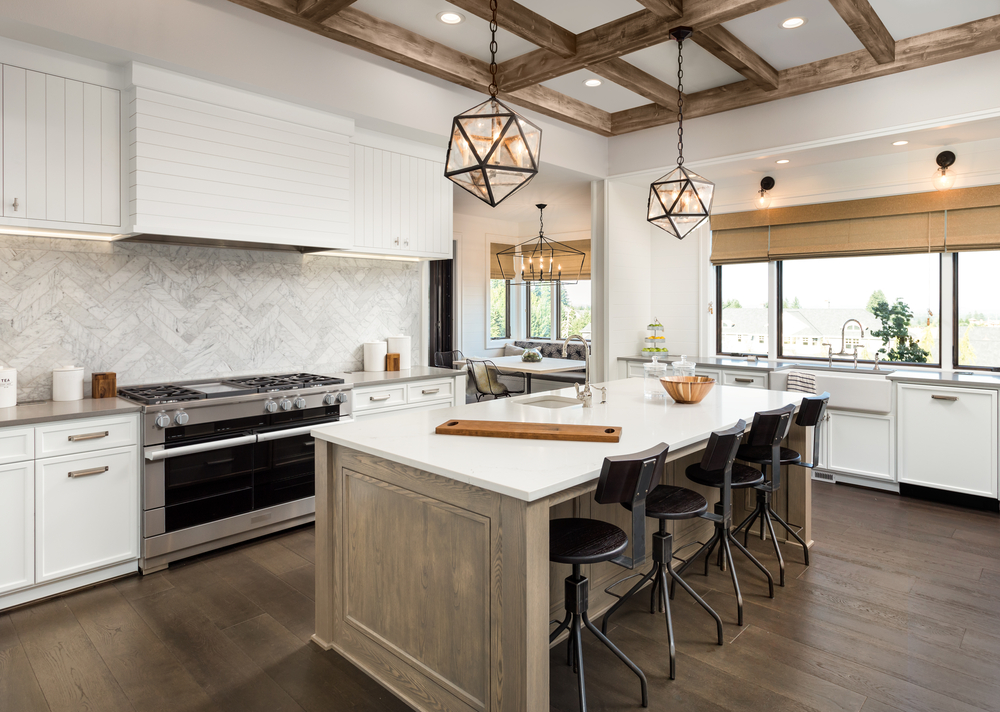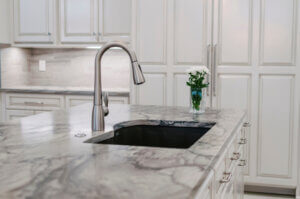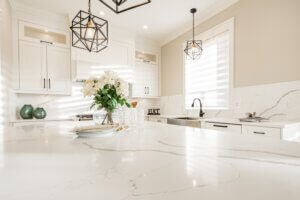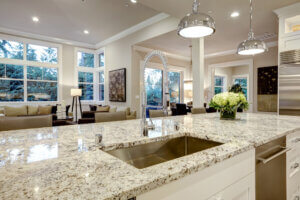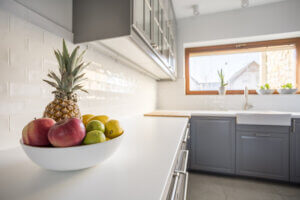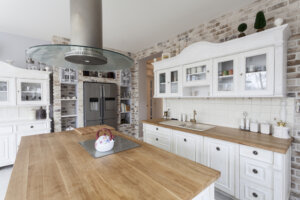We spend a lot of time in our kitchens even when we’re not cooking. We entertain, work on projects and enjoy our morning coffee in them. With all the action our kitchens see, it’s no surprise that our countertops can get worn down after years of use. If it’s time to repair, replace, or install new kitchen countertops you need to know your options. Comparing the costs, pros, and cons of each countertop will help you make a decision that is best for your home and lifestyle. Below are the most common countertop materials, their costs, and the pros and cons of each.
Quartz
Quartz countertops are aesthetically pleasing with the ability to give your kitchen a beautiful look. Quartz is a product that is non-porous, meaning that it will repel liquids and therefore will not stain. Quartz is also quite durable allowing it to be scratch proof. The cons of the quartz countertop is that it can discolour from being in the sunlight and it is not heat resistant, so hot pads will need to be used while cooking.
Cost:
The average cost of a quartz countertop is $50-$150 per square foot, not including installation fees.
Marble
Marble comes in a variety of colours and patterns that allow you to customize your countertops to best match your home. Marble is heat resistant, which makes it convenient while cooking to not have to worry about laying hot pots and pans on the countertop. Unfortunately, marble is porous, meaning it will absorb liquids, and can stain. It is also soft, which makes is susceptible to scratches and chips. For these reasons marble is high maintenance and it is also one of the more expensive countertop materials.
Cost:
The average cost of a marble countertop is $60-$190 per square foot, not including installation fees.
Granite
Granite is a low cost, aesthetically pleasing, natural product that comes in more than 20 shades making it very versatile and easy to match your kitchen. It is a hard surface that is not susceptible to scratches, can handle heat, and if treated properly, can be resistant to stains. Granite will dull knife blades if used directly on the material, so cutting boards are necessary if you want to keep your knives sharp. If the material is not sealed properly, granite will absorb liquids that are spilled onto it which can lead to permanent stains on your countertop. While it is a durable material, it is still susceptible to chips and cracks if something is dropped on it.
Cost:
The average cost of a granite countertop is $50-$140 per square foot, not including installation fees.
Solid Surface
Solid surface countertops refer to materials such as engineered stone quartz, corian, and acrylic, just to name a few. New technology has allowed manufacturers to be able to create a wide variety of colours, patterns, and textures that look like real materials. These countertops have become increasingly popular due to the fact that they can look like expensive materials, for a cheap cost. These countertops are very durable, making them resistant to impact, stain resistant, easy to clean and scratch resistant. However, they are vulnerable to heat, heavy duty scratches from cutlery, and are prone to stronger chemical stains.
Cost:
The average cost of engineered hardwood is $15-$70, acrylic is $10-$30, and corian is $20-$75, per square foot and not including installation fees.
Butcher Block
Butcher block countertops come in a variety of colours and styles, they are more sustainable compared to the others, and they have antibacterial properties. Unfortunately, since the material is wood, scratches and dents will accumulate over time, forcing you to use cutting boards in order to protect the surface. Routine maintenance and proper sealing is required, as well as proper treatment to ensure no water damage.
Cost:
The average cost of a butcher block countertop is dependent on the type of wood that you choose. The cost can range from $10-$35 per square foot, not including installation fees.
When installing new countertops, factors that will influence the price the most are the materials thickness, the edging style, the specific cuts and angles, the number of slabs required, and how you choose to finish the material. If these countertops are too common for you, check out our favourite unique kitchen countertop materials. When you’re ready to talk to a pro about your options or if you’re ready to get your project started now, get quotes from countertop specialists in your area on HomeStars.
